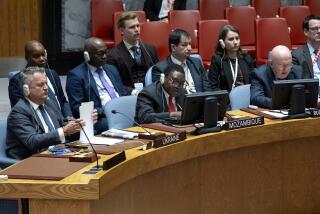Human Rights--Route to Soviet Evolution
- Share via
Another summit. Perhaps another treaty. And in an election year.
Reagan Administration spokesmen assure us that excessive concessions will not be made merely for political advantage at home. On the other hand, it may be that Mikhail S. Gorbachev will want to have American “conservative” endorsement, as well as the “liberal” American constituency that he relies on already, in order to solidify the new Soviet effect on American politics. So he and his colleagues may not hold out for too ostentatious a triumph. Thus, even on a cynical view, we might just possibly get a good, or goodish, treaty.
If we are skeptical, it is in part because of the treaty on intermediate-range nuclear forces, which is now accepted by almost everyone but which is really welcomed by few--particularly in Europe, the area concerned. Its virtue is seen as supposedly leading to a cycle of better treaties. Perhaps it may. Meanwhile, the most easily solved problem is not being tackled: the offensive forward deployment of Soviet conventional forces in Europe. The solution does not even require any disarmament, but merely the withdrawal of a couple of tank armies from East Germany and closing down 15 or 20 advanced-strike airfields. And that is a minimal condition without which INF-type negotiations mean nothing.
At any rate, treaties are not to be sought simply to “improve mutual understanding.” Nor simply for disarmament as such, for our problem is not merely one of weapons. If all nuclear weapons in the world were abolished tomorrow, and a conventional war broke out between the Eastern and Western blocs, it would obviously become nuclear as soon as the belligerents could make it so. Indeed, a total nuclear disarmament might, by improving the immediate chances of an aggressor in conventional war, make a nuclear war more likely. So, of course, might an asymmetrical partial nuclear disarmament. There can be no mere welcome for any particular arms accord for its own sake, but only to the degree that it decreases the chances of war.
Moreover, as Andrei Sakharov has also put it, “No matter how important arms-control discussions are, they can produce decisive results only when they are joined to the resolutions of broader and more complicated problems of military-political and ideological confrontation, including questions of human rights.”
For the central problem remains not arms in themselves, but hostility. The Administration proposes to raise human-rights issues at the summit meeting. This is sometimes taken (by both its sponsors and its opponents) as merely a moralistic stance. But, properly considered, it goes much deeper. Only when the Communist Party has withdrawn its claim to monopolistic control over the whole of Soviet society can it be regarded as withdrawing its equally total claim to world hegemony, and only when it allows the expression of non-communist views will it acknowledge the legitimacy of other ideas and political orders. The human rights that are relevant to long-term peace are not so much the whole spectrum of what we ourselves may regard as desirable, but the free movement of people and ideas. At the insistance of some of the smaller European powers, this was made a part of the Helsinki Agreement--explicitly as the condition for stable peace.
We are told that in the era of glasnost there is no obstacle to improved relations. Those who take a slightly more skeptical view are accused of thinking that the Soviet system “cannot change.” On the contrary, most serious observers of the Moscow regime have always maintained that, in George Orwell’s words, the Soviet Union must “either democratize or perish”--or, if not democratize, at least somehow evolve from being a closed society based on force, fraud and dogma. And if we envisage an eventual Soviet Union that has so changed, then it is obvious that there must be some form of transition.
Obviously this is a process that we should encourage. Encouragement does not mean accepting that it has happened when it hasn’t. Nor, above all, does it mean giving economic or military concessions that would make change unnecessary.
This is not to be too schematic about the point at which we can assume genuine cooperation. Our attitude can change, keeping pace with Soviet evolution as--and if--it actually takes place. But our criteria must be based at every point on careful assessments of internal and international reality. And we should encourage a reformist Soviet regime precisely to the degree that it fulfills those criteria. In that way we may, however gradually, move toward a cooperative world order. This summit meeting can make a contribution, but only if that perspective is kept in mind.
More to Read
Sign up for Essential California
The most important California stories and recommendations in your inbox every morning.
You may occasionally receive promotional content from the Los Angeles Times.










